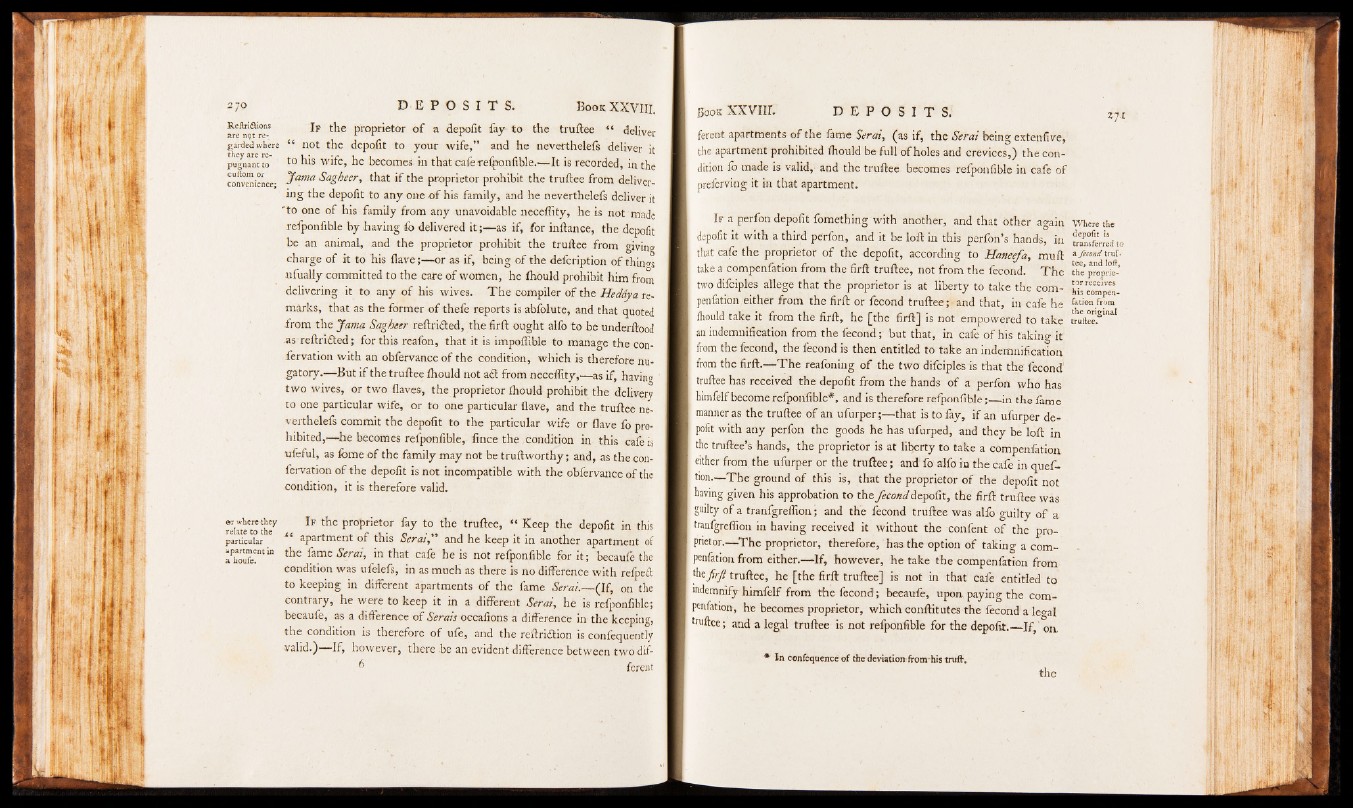
D E P O S I T S .
Reftridtions
are ngt regarded
where
they are repugnant
to
cuitom or
convenience;
or wherethey
relate to the
particular
apartment in
a houfe.
If the proprietor o f a depofit fay1 to the truftee “ deliver
“ not the depofit to your wife,” and he nevefthelefs deliver it
to his wife, he becomes in that cafe relponfible.— It is recorded, in the
Jama Sagheer, that i f the proprietor prohibit the truftee from delivering
the depofit to any one o f his family, and he neverthelefs deliver it
'to one of his family from any unavoidable neceflity, he is not made
refponfible by having fo delivered it;— as if, for inftance, the depofit
be an animal, and the proprietor prohibit the truftee from giving
charge of it to his Have;— or as if, being of the defcription of things
ufually committed to the care of women, he Ihould prohibit him from
delivering it to any o f his wives. The compiler of the Heddya remarks,
that as the former o f thefe reports is abfolute, and that quoted
from the Jama Sagheer reft rifted, the firft ought alio to be underftood
as reftri&ed; for this realbn, that it is impoflible to manage the con-
fervation with an oblervance of the condition, which is therefore nugatory.—
But if the truftee Ihould not aft from neceflity,— as if, having
two wives, or two Haves, the proprietor Ihould prohibit the delivery
to one particular wife, or to one particular Have, and the truftee neverthelefs
commit the depofit to the particular wife or Have fo prohibited,—
he becomes refponfible, fince the condition in this cafe is
ufeful, as fo me o f the family may not be truft worthy; and, as the con-
fervation of the depofit is not incompatible with the obfervance of the
condition, it is therefore valid.
I f the proprietor fay to the truftee, “ Keep the depofit in this
11 apartment of this Serai," and he keep it in another apartment of
the fame Serai, in that cafe he is not refponfible for it ; becaufe the
condition was ufelefs, in as much as there is no difference with refpett
to keeping in different apartments of the fame Serai.— (If, on the
contrary, he were to keep it in a different Serai, he is refponfible;
becaufe, as a difference of Serais occafions a difference in the keeping,
the condition is therefore of ufe, and the reftriftion is confequently
valid.) If, however, there.be an evident difference between twodif-
6 ferent
ferent apartments of the fame Serai, (as if, the Serai being extenfive,
the apartment prohibited Ihould be full of holes and crevices,) the condition
fo made is valid, and the truftee becomes refponfible in cafe of
preferving it in that apartment.
I f a perfon depofit fomething with another, and that other again Where the
depofit it with a third perfon, and it be loft in this perfon’s hands, in t0
that cafe the proprietor of the depofit, according to Haneefa, muft a / " ^ tm T .
: take a compenfation from the firft truftee, not from the fécond. T h e the prôprîe-
two difciples allege that the proprietor is at liberty to take the com- K§||a*i’*
I penfation either from the firft or fécond truftee ; and that, in cafe he fation from
I fhould take it from the firft, he [the firft] is not empowered to take muiee.2'"*1
an indemnification from the fécond ; but that, in cafe of his taking it
from the fécond, the fécond is then entitled to take an indemnification
J from the firft.— T h e reafoning of the two difciples is that the fécond'
! truftee has received the depofit from the hands of a perfon who has
Kimfelf become refponfible*, and is therefore refponfible ;— in the fame
f manner as the truftee of an ufurper;— that is to fay, if an ufurper depofit
with any perfon the goods he has ufurped, and they be loft in
; the truftee’s hands, the proprietor is at liberty to take a compenfation
either from the ufurper or the truftee ; and fo alfo in the cafe in quef-
ti°n— The ground of this is, that the proprietor of the depofit not
having given his approbation to the fécond depofit, the firft truftee was
guilty of a tranfgreflion ; and the fécond truftee was alfo guilty o f a
tranfgreflion in having received it without the confient of the proprietor.—
The proprietor, therefore, has the option o f taking a compenfation
from either.— If, however, he take the compenfation from
^ firft truftee, he [the firft truftee] is not in that cafe entitled to
indemnify himfelf from the fécond ; becaufe, upon, paying the compenfation,
he becomes proprietor, which conflit utes the fécond a leo-al
truftee; and a legal truftee is not refponfible for the depofit.— If, on.
* In confèquence of the deviation from-his truft.